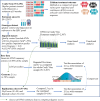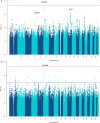Association of polygenic score and the involvement of cholinergic and glutamatergic pathways with lithium treatment response in patients with bipolar disorder
- PMID: 37433967
- PMCID: PMC11041653
- DOI: 10.1038/s41380-023-02149-1
Association of polygenic score and the involvement of cholinergic and glutamatergic pathways with lithium treatment response in patients with bipolar disorder
Abstract
Lithium is regarded as the first-line treatment for bipolar disorder (BD), a severe and disabling mental health disorder that affects about 1% of the population worldwide. Nevertheless, lithium is not consistently effective, with only 30% of patients showing a favorable response to treatment. To provide personalized treatment options for bipolar patients, it is essential to identify prediction biomarkers such as polygenic scores. In this study, we developed a polygenic score for lithium treatment response (Li+PGS) in patients with BD. To gain further insights into lithium's possible molecular mechanism of action, we performed a genome-wide gene-based analysis. Using polygenic score modeling, via methods incorporating Bayesian regression and continuous shrinkage priors, Li+PGS was developed in the International Consortium of Lithium Genetics cohort (ConLi+Gen: N = 2367) and replicated in the combined PsyCourse (N = 89) and BipoLife (N = 102) studies. The associations of Li+PGS and lithium treatment response - defined in a continuous ALDA scale and a categorical outcome (good response vs. poor response) were tested using regression models, each adjusted for the covariates: age, sex, and the first four genetic principal components. Statistical significance was determined at P < 0.05. Li+PGS was positively associated with lithium treatment response in the ConLi+Gen cohort, in both the categorical (P = 9.8 × 10-12, R2 = 1.9%) and continuous (P = 6.4 × 10-9, R2 = 2.6%) outcomes. Compared to bipolar patients in the 1st decile of the risk distribution, individuals in the 10th decile had 3.47-fold (95%CI: 2.22-5.47) higher odds of responding favorably to lithium. The results were replicated in the independent cohorts for the categorical treatment outcome (P = 3.9 × 10-4, R2 = 0.9%), but not for the continuous outcome (P = 0.13). Gene-based analyses revealed 36 candidate genes that are enriched in biological pathways controlled by glutamate and acetylcholine. Li+PGS may be useful in the development of pharmacogenomic testing strategies by enabling a classification of bipolar patients according to their response to treatment.
© 2023. The Author(s).
Conflict of interest statement
Eduard Vieta has received grants and served as consultant, advisor or CME speaker for the following entities: AB-Biotics, Allergan, Angelini, AstraZeneca, Bristol-Myers Squibb, Dainippon Sumitomo Pharma, Farmindustria, Ferrer, Forest Research Institute, Gedeon Richter, GlaxoSmith-Kline, Janssen, Lundbeck, Otsuka, Pfizer, Roche, Sanofi-Aventis, Servier, Shire, Sunovion, Takeda, the Brain and Behaviour Foundation, the Spanish Ministry of Science and Innovation (CIBERSAM), and the Stanley Medical Research Institute. Michael Bauer has received grants from the Deutsche Forschungsgemeinschaft (DFG), and Bundesministeriums für Bildung und Forschung (BMBF), and served as consultant, advisor or CME speaker for the following entities: Allergan, Aristo, Janssen, Lilly, Lundbeck, neuraxpharm, Otsuka, Sandoz, Servier and Sunovion outside the submitted work. Sarah Kittel-Schneider has received grants and served as consultant, advisor or speaker for the following entities: Medice Arzneimittel Pütter GmbH and Shire/Takeda. Bernhard Baune has received grants and served as consultant, advisor or CME speaker for the following entities: AstraZeneca, Bristol-Myers Squibb, Janssen, Lundbeck, Otsuka, Servier, the National Health and Medical Research Council, the Fay Fuller Foundation, the James and Diana Ramsay Foundation. Scott Clark has received grants and served as consultant, advisor or CME speaker for the following entities: Otsuka Austalia, Lundbeck Australia, Janssen-Cilag Australia, Servier Australia. Tadafumi Kato received honoraria for lectures, manuscripts, and/or consultancy, from Kyowa Hakko Kirin Co, Ltd, Eli Lilly Japan K.K., Otsuka Pharmaceutical Co, Ltd, GlaxoSmithKline K.K., Taisho Toyama Pharmaceutical Co, Ltd, Dainippon Sumitomo Pharma Co, Ltd, Meiji Seika Pharma Co, Ltd, Pfizer Japan Inc., Mochida Pharmaceutical Co, Ltd, Shionogi & Co, Ltd, Janssen Pharmaceutical K.K., Janssen Asia Pacific, Yoshitomiyakuhin, Astellas Pharma Inc, Wako Pure Chemical Industries, Ltd, Wiley Publishing Japan, Nippon Boehringer Ingelheim Co Ltd, Kanae Foundation for the Promotion of Medical Science, MSD K.K., Kyowa Pharmaceutical Industry Co, Ltd and Takeda Pharmaceutical Co, Ltd. Tadafumi Kato also received a research grant from Takeda Pharmaceutical Co, Ltd. Peter Falkai has received grants and served as consultant, advisor or CME speaker for the following entities Abbott, GlaxoSmithKline, Janssen, Essex, Lundbeck, Otsuka, Gedeon Richter, Servier and Takeda as well as the German Ministry of Science and the German Ministry of Health. Eva Reininghaus has received grants and served as consultant, advisor or CME speaker for the following entities: Janssen and Institut Allergosan. Mikael Landén declares that, over the past 36 months, he has received lecture honoraria from Lundbeck and served as a scientific consultant for EPID Research Oy; no other equity ownership, profit-sharing agreements, royalties or patent. Kazufumi Akiyama has received consulting honoraria from Taisho Toyama Pharmaceutical Co, Ltd. In 2021, Jörg Zimmermann served as an advisor for Biogen concerning Aducanumab (Alzheimer’s Disease).The other authors have no other conflict of interest to disclose.
Figures



Update of
-
Association of Polygenic Score and the involvement of Cholinergic and Glutamatergic Pathways with Lithium Treatment Response in Patients with Bipolar Disorder.Res Sq [Preprint]. 2023 Feb 14:rs.3.rs-2580252. doi: 10.21203/rs.3.rs-2580252/v1. Res Sq. 2023. Update in: Mol Psychiatry. 2023 Dec;28(12):5251-5261. doi: 10.1038/s41380-023-02149-1. PMID: 36824922 Free PMC article. Updated. Preprint.
References
-
- Grande I, Berk M, Birmaher B, Vieta E. Bipolar disorder. Lancet. 2016;387:1561–72. - PubMed
-
- DALYs GBD, Collaborators H. Global, regional, and national disability-adjusted life-years (DALYs) for 359 diseases and injuries and healthy life expectancy (HALE) for 195 countries and territories, 1990-2017: a systematic analysis for the Global Burden of Disease Study 2017. Lancet. 2018;392:1859–922. - PMC - PubMed
-
- Cade JF. Lithium salts in the treatment of psychotic excitement. Med J Aust. 1949;2:349–52. - PubMed

